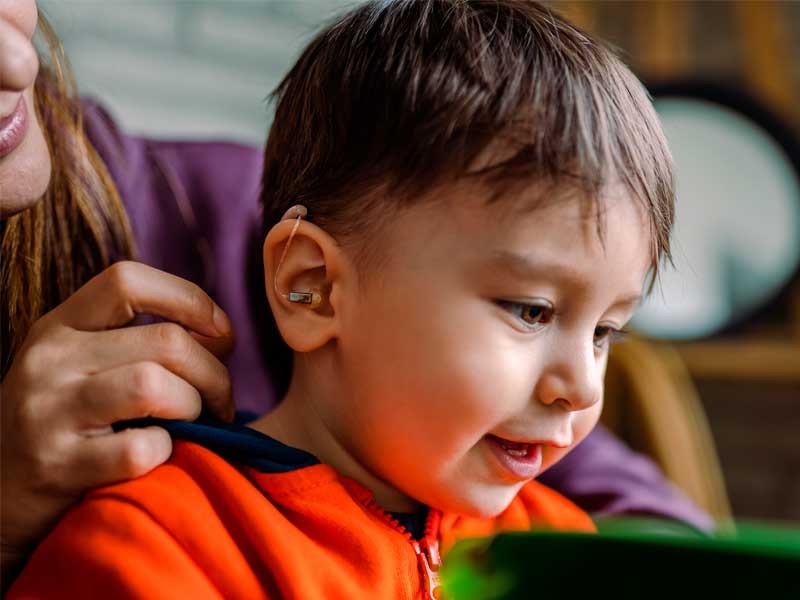
Conecta: 10 facts you may not know about hearing loss
UC expert says preventing hearing loss starts at an early age
The World Health Organization estimates that by 2050 almost 2.5 billion people will have some degree of hearing loss, while 700 million will require some form of rehabilitation. In a story published by Conecta, a media outlet from Mexico, Brian Earl, PhD, of the Department of Communication Sciences and Disorders at the UC College of Allied Health Sciences said there are solutions and technology to treat hearing loss, but there is still much to be done to make those remedies accessible to all.
Conecta reported that as people get older, hearing loss related to aging is inevitable. However, Earl said that there are steps that can be taken to something about its progression.
"We can prevent hearing loss from an early age by taking care of the volume with which we listen to music or using earplugs if we work in noisy environments," Earl said.

Brian Earl, PhD, Department of Communication Sciences and Disorders in the College of Allied Health Sciences/Photo/Colleen Kelley/UC Marketing + Brand
As with other health conditions, hearing loss can be mild, moderate or severe, and Earl explained that it also depends on the location of the damage.
"The ear is composed of three parts: external, middle and internal," he said. "Hearing problems involving the outer ear can be as simple as earwax blocking the ear canal."
Earl said some hearing loss that can occur due to genetic changes during the different stages of a baby's gestation.
"The structures of the ear (external, middle and internal) develop at different times and, either by genetic changes or by something in the mother's environment, it can lead to congenital hearing loss," he said. "Other conditions related to the birth of the baby, for example, the time it takes to take his first breath, lack of oxygen can cause damage to the cells of the ear."
Earl said medical associations have pondered whether it is advisable to have annual checkups or every three or five years to check hearing health.
"I suggest that as soon as someone notices a change or red flag, they go for a check-up to determine if it's something temporary or a hearing loss that will gradually become more pronounced," he said. "I also lean toward recommending early screening because if it takes years before diagnosing a hearing loss, it can lead to changes in people's physical and social health."
Note: Article is published in Spanish, click on the 'translate' button to read in English.
Next Lives Here
The University of Cincinnati is classified as a Research 1 institution by the Carnegie Commission and is ranked in the National Science Foundation's Top-35 public research universities. UC's graduate students and faculty investigate problems and innovate solutions with real-world impact. Next Lives Here.
Related Stories
AARP: How to improve your pandemic posture
February 18, 2022
Working in the pandemic over the last two years has meant developing a space to work at home for most of us. An article published by AARP takes a look at some potential problems that can crop up working at home in the way of pandemic posture habits. Susan Kotowski, PhD, of the Department of Rehabilitation, Exercise and Nutrition Sciences in the UC College of Allied Health Sciences, is cited as an expert for the story.
UC, UC Health see frontline student training as workforce solution
May 6, 2025
Amid ongoing challenges across the health care workforce, including burnout and shortages, the University of Cincinnati is working to tackle this issue through a program that embeds students in clinical settings.
UC program tackles health care worker shortage
April 15, 2025
The Healthcare Exploration Through Patient Care course allows University of Cincinnati students to train and work as patient care assistants (PCAs) within the UC Health system, offering them paid, hands-on experience in hospital settings while earning academic credit.
WLWT: Experts concerned about surge in problem gambling
April 4, 2023
The University of Cincinnati's Gregory Stewart, PhD, joined WLWT to discuss the impact of problem gambling in Ohio and how social workers are being trained to meet this new need.
Conecta: 10 facts you may not know about hearing loss
March 6, 2023
Brian Earl, PhD, of the College of Allied Health Sciences was interviewed by Mexican media outlet Conecta for a story called 10 facts you may not have known about hearing loss.
Yahoo Life: Three simple ways to move more and prevent muscle pain while working from home
April 29, 2021
Prevention magazine cited a research study from the University of Cincinnati looking at ergonomics and working from home. The researchers sent an email survey last year to 4,500 faculty and staff after the coronavirus pandemic prompted UC to ask workers to continue operations from home when possible. The survey had 843 people complete it and showed some trends and offered a glimpse into what many who work from home were encountering.
WMC-TV, Memphis: Teens stopping suicides
February 2, 2021
Jennifer Wright-Berryman, PhD, of the School of Social Work at the UC College of Allied Health Sciences was interviewed in a segment produced by Ivanhoe News and aired on WMC-TV in Memphis focusing on the fight against teen suicide. Wright-Berryman is the lead national researcher for Hope Squad.
CNN Business: It's been a year. Here's what your home office should look like
March 19, 2021
Susan Kotowski of the College of Allied Health Sciences offered her expertise for CNN Business in a story on what a home office should look like with so many people transitioning to a home office since the onslaught of the COVID-19 pandemic.
Fast Company: How to handle the challenges of a makeshift home office
December 12, 2020
A team of researchers at UC conducted an ergonomic assessment of employees at the university by sending an email survey earlier this year to 4,500 faculty and staff after the coronavirus pandemic prompted the university to ask workers to continue operations from home when possible. The survey had 843 people complete it and showed some trends and offered a glimpse into what many who work from home were encountering. Susan Kotowski, PhD, a UC associate professor of allied health sciences, was part of a team of researchers conducting the survey. She spoke to Fast Company for a story about ergonomics in makeshift home offices.
Cincinnati media highlight UC's return to campus
August 25, 2021
Bearcats are returning to in-person classes and activities at the University of Cincinnati this fall with excitement and a dose of caution for COVID-19 restrictions. Cincinnati media are reporting that more than 46,700 students are expected to begin instruction with a more traditional fall term.
